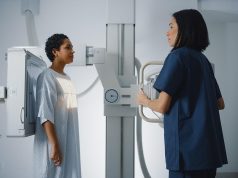Increasing distress also seen with increased housing and food insecurity among women with breast cancer
By Elana Gotkine HealthDay Reporter
TUESDAY, Jan. 2, 2024 (HealthDay News) — Among women undergoing radiation therapy for breast cancer, Spanish speakers have an increased risk for depression and anxiety, according to a study published online Dec. 7 in the International Journal of Radiation Oncology, Biology and Physics.
Corina Beiner, from the Boston University Chobanian & Avedisian School of Medicine, and colleagues describe the changes in levels of depression and anxiety experienced throughout a course of radiation therapy for breast cancer. Pretreatment and posttreatment surveys were completed before and after radiation therapy; the survey ended with the standardized Patient Health Questionnaire-4 for assessing anxiety and depression.
One hundred sixty participants completed pretreatment and posttreatment surveys. The researchers found that participants were primarily non-White and married and had a high school or associate’s level education (50, 42.5, and 46.9 percent, respectively). The total baseline distress mean (BDM) was 2.96 and final distress mean was 2.78; the BDM was 2.91 and 3.21 for English- and Spanish-speaking patients, respectively, with an adjusted change mean decrease of 0.45 and increase of 1.03, respectively. Increasing distress was seen with increased housing and food insecurity at baseline.
“Moving forward, patients who speak Spanish, identify as Hispanic, or are experiencing food and housing insecurity require more support during their course of radiation therapy to minimize distress,” the authors write. “As the number of Spanish speakers and Hispanics in the United States continues to increase, it will be important to continue assessing potential differences in cancer care.”
Copyright © 2024 HealthDay. All rights reserved.








